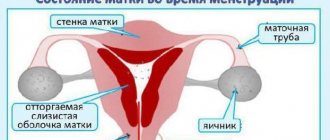A fever is not always a sign of a cold. Sometimes a woman may encounter a situation where she gets hot before her period. The reason for this may lie among both physiological and pathological factors. In any case, such a symptom should not be ignored.
Sometimes I get a fever before my period
Normal or disease
Hot flashes before menstruation are most often an individual reaction of the body to an endogenous or exogenous stimulus. Also, this condition may be accompanied by increased blood pressure, facial hyperemia, and increased sweating. Low-grade fever caused by physiological causes is usually accompanied by a migraine-type headache.
Menstruation and PMS are conditions characterized by increased hormone levels. If you feel the usual symptoms for you before the onset of your period, then a slight fever before your period is normal.
In most cases, fever does not bother young women, but as they approach menopause, the malaise may become more and more severe, and hot flashes may appear more often.
So, the reasons why you feel hot during menstruation include:
- ovulatory period;
- menopause;
- menopause;
- PMS;
- vegetative-vascular dystonia (VSD) – insufficient tone of blood vessels;
- thyroid dysfunction;
- lack of female sex hormones.
What symptoms are accompanied by fever during pregnancy?
At the moment when the fertilized egg attaches to the wall of the uterus, a woman may experience a feeling of heat or cold. This is explained by the fact that in the early stages of pregnancy the entire female body undergoes a restructuring for the upcoming pregnancy. The result of such hormonal changes is a rise in temperature. In addition to fever, a woman may experience spotting, weakness, dizziness, and increased sweating.
Hot flashes in the early stages are one of the main signs indicating that conception has occurred.
Vegetovascular dystonia
Vegetovascular dystonia is a condition characterized by dysfunction of the autonomic nervous system, manifested in insufficient vascular tone. It is characterized by increased fatigue, anxiety, headaches and sleep disturbances. Often women with VSD feel feverish during menstruation, they experience panic attacks, and develop hypertensive crises.
VSD is caused by many factors, including hereditary ones. If hot flashes appear as a result of severe stress or changes in external circumstances, then perhaps VSD is a temporary symptom complex that will pass as it adapts to new conditions. If the pathology of vascular tone is caused by metabolic disorders, atherosclerosis or diabetes mellitus, a comprehensive examination is required in order to select adequate therapy.
What do hot flashes indicate during menstruation and how to deal with them?
A feeling of heat and redness of the face, after which increased sweating often begins - all this characterizes hot flashes. But not only during the period of menopause, a woman can be bothered by such disorders. What are the reasons that cause hot flashes during menstruation? Should I be too worried and how can I normalize my condition?
Causes of hot flashes
Hot flashes are characterized by a sudden feeling of heat and redness in the face, neck and chest.
This condition may also be accompanied by increased blood pressure, palpitations, discomfort in the chest, trembling, anxiety, etc.
In most cases, this interferes with a woman’s normal life. Attacks can be repeated with completely different frequency - from once a month to 20 - 30 per day.
Climax
During the period of menopause, hot flashes in women are associated with estrogen deficiency. Their insufficient quantity is due to a decrease in the function of the ovaries, where the bulk of sex hormones are formed. Moreover, often women with excess body weight do not feel such manifestations so much. This is due to the fact that adipose tissue is an additional source of estrogen.
Due to the fact that when the functioning of the ovaries decreases, a deficiency of sex hormones occurs, the pituitary gland and hypothalamus react to this according to the feedback principle.
They send constant signals to increase estrogen production.
As a result, at the next peak of the release of active substances into the blood, the peripheral blood vessels expand and the blood flow through them increases. A classic clinic of hot flashes arises.
As a result, body temperature drops slightly due to the loss of a large amount of heat. This is why a woman first feels hot and then feels cool.
Often, hot flashes are accompanied by other symptoms that are visible and also perceptible only to the woman - redness, increased sweating, etc.
In addition to hot flashes, the following symptoms will indicate the imminent onset of menopause:
- Vaginal dryness, discomfort and even pain during sexual intercourse. This is also due to a deficiency of estrogen, which is responsible for the production of secretions and the renewal of the epithelium. Various suppositories and ointments help to cope with these conditions. They often contain small amounts of estrogen.
- Women also report various difficulties falling asleep. Often in the evening before this they become irritable, focus their attention on minor problems, and worry for no apparent reason. Coping with such conditions is not always easy; sometimes you have to resort to the help of serious sleeping pills.
- When menopause occurs, women experience a decrease in libido. This is due to a decrease in the content of sex hormones in the blood.
- Dryness of all mucous membranes often begins to bother you. This causes discomfort in the eyes, problems with urination, digestion, swallowing poorly moistened food, etc.
- The figure of women is also changing. Due to a decrease in metabolic rate while maintaining the same lifestyle, a couple of extra pounds “come.” Also, skin, nails and hair lose vitality, fade and become less attractive.
Watch the video about menopausal syndrome:
Lack of sex hormones
Often, estrogen deficiency can occur in women for other reasons. With significant impairment of ovarian function, early menopause occurs.
Similar conditions often occur after removal of endometriosis lesions. Especially if they were located on the ovaries, as well as when removing cysts, after surgical treatment of apoplexy, etc. Moreover, after manipulation it can take up to 5-10 years. Sometimes such phenomena are called “ovarian exhaustion.”
A similar thing happens when two ovaries are removed at once or after chemotherapy or radiation, which is carried out for malignant tumors. In this case we are talking about post-castration syndrome.
Usually, some time after surgical treatment or serious hormonal interventions, a woman begins to notice symptoms similar to menopause.
Their intensity varies and depends both on the properties of the organism itself and on the part of the still functioning ovary.
The main thing is to suspect violations in time, since young women need competent hormone replacement therapy before reaching menopause.
In the absence of such treatment, their quality of life is lower compared to healthy people.
How to normalize the condition
Treatment for hot flashes depends on the cause that caused them. The doctor can recommend the most appropriate therapy after examination and establishing the true nature of the problem.
Lifestyle
It has long been noted that women who regularly engage in sports tolerate various menopausal symptoms, including hot flashes, much easier. Relaxing and breathing exercises, walks in the fresh air (for example, Nordic walking, etc.) are especially useful. All this helps normalize sleep, cope with stressful situations and respond adequately to difficulties.
You should also pay attention to nutrition. After all, if you maintain your previous diet while ovarian function fades, then the extra pounds will not keep you waiting.
Nutrition should be made as balanced as possible in terms of protein, fat and carbohydrates. It is necessary to eat enough fresh fruits and vegetables.
In addition to vitamins and microelements, they bring many elements of the antioxidant system into the body, helping to fight harmful metabolic products.
Lifestyle correction will help reduce the manifestations of hot flashes not only in case of hormone deficiency, this is also important in case of vegetative-vascular dystonia.
Hormonal drugs
Hormone replacement therapy today is widely used to correct menopausal disorders, as well as to correct post-castration syndrome and lack of sex hormones for other reasons.
Despite the current caution towards these drugs, they do not increase the risk of developing malignant diseases of any location, including the mammary glands.
Correct and, very importantly, timely administration of HRT drugs improves a woman’s quality of life significantly.
If ovarian dysfunction occurs at a young age, hormonal therapy is prescribed in a cyclic mode with imitation of menstruation.
Vitamins, dietary supplements, herbal medicines
There are a large number of different complexes based on phytoestrogens, vitamins and simply biological food additives, which help to significantly reduce hot flashes during menstruation associated with hormonal disorders.
Hot flashes, as a symptom of estrogen deficiency, are typical for women of menopausal age, as well as after removal of the ovaries or the harmful effects of chemotherapy and radiation on them.
Also, similar attacks can occur against the background of vegetative-vascular dystonia in young and active girls.
Only a specialist can finally understand the problem and find the most effective treatment after a comprehensive examination.
Source: https://ProMesyachnye.ru/prilivy-vo-vremya-mesyachnyx/
Premenopausal period
Menopause and subsequent menopause are natural processes for a woman, this is a kind of logical conclusion of the reproductive function of the female body, when the extinction and involution of the organs of the reproductive system, especially the ovaries, occur.
The premenopausal period often lasts for 3–7 years and is characterized by a number of symptoms, including bouts of fever and sweating.
If you feel hot before your period during the premenopausal period, then there is no need to worry. This is a consequence of changes in hormonal balance associated with menopause. This condition can be easily corrected if you follow the general recommendations:
- Healthy eating with lots of vegetables and fruits.
- Hormone replacement therapy.
- Establishing a physical activity regimen.
- Normalization of sexual life.
- Strengthening the body's immune system, monitoring the state of chronic pathologies.
- Rejection of bad habits.
At the first symptoms of menopause, it is necessary to consult a gynecologist and have a mammogram, since at this age there is a high probability of developing breast cancer. Depending on individual indicators, the doctor will prescribe effective medications and give the necessary recommendations.
How does an attack occur?
During an attack, heat is felt throughout the body, it sweats. Such hot flashes are accompanied by palpitations and redness of the skin. They occur periodically and can appear up to several times during the day. This is caused by changes in the vegetative-vascular system due to hormonal disorders.
During menopause, this phenomenon is considered within normal limits. This usually begins several years before the onset of menopause. At this time, the ovaries complete the work of producing follicles, and the woman’s ability to bear children disappears.
Sometimes the appearance of hot flashes is associated with the end of menstruation. However, this is not always true. Menopause is characterized by the absence of the hormone estrogen in the blood, which should be in every cell of the female body during reproductive age. Due to its lack, vascular spasms occur. Estrogen improves brain function and with its deficiency, psychological problems and calcium leaching can occur.
Lack of female sex hormones
Estrogen deficiency can also occur at a young age. Such a hormonal disorder may be a consequence of organic damage to the ovaries, resulting in an early pause. The main symptom in this case will be hot flashes during menstruation.
The causes of depletion of the female reproductive glands can be:
- Endometriosis, or more precisely, surgery to remove it. Especially if the lesion was localized in the ovary.
- Removal of cysts, treatment of apoplexy.
- Long-term hormonal therapy.
- Frequent IVF attempts.
- Hyperstimulation of the organ.
- Removal of the ovaries due to malignant tumors.
Usually, a few months after surgery or an exacerbation of organ damage, a woman begins to feel a complex of symptoms corresponding to the onset of menopause. The intensity varies and depends on the degree of damage to the ovary.
The main thing is to consult a doctor in time and make a diagnosis in the early stages in order to begin hormone replacement therapy, which will significantly improve the girl’s quality of life.
Preventive measures and medications
Since the phenomenon is completely natural, almost all treatment comes down to prevention. The first step is to focus your efforts on maintaining enhanced hygiene during the PMS period. Dermatologists recommend showering at least once a day and after any physical activity.
In addition to following a balanced diet, you should exclude foods that are too spicy, rich in spices, hot or sweet from your menu. Due to increased sensitivity to all irritating factors, they can cause sweating almost immediately after consumption.
Pathology of the thyroid gland
The thyroid gland is the central organ that regulates the body's metabolism. With its hypo- or hyperfunction, unpleasant pathological conditions develop. Thus, hyperthyroidism is accompanied by a symptom complex that includes:
- sweating;
- disorders of the cardiovascular system, accompanied by an accelerated heartbeat;
- tremor of the limbs;
- increased blood pressure;
- gastrointestinal disorders;
- constant thirst and, as a result, frequent urination.
If you feel hot during your period, and one of the symptoms listed above is also present, this may indicate a pathology of the thyroid gland. This condition requires echo diagnostics and hormonal blood tests.
When should you go to the doctor?
A slight increase in temperature, as one of the symptoms of PMS, is quite common and quite normal. The critical point when you feel feverish is when the temperature rises to 37.6 degrees.
If before menstruation the temperature rises above this indicator and lasts for several days, then this may indicate serious illness. This means that you need to visit a doctor and undergo the examination that he prescribes.
The causes of the disease may be the following:
- Very often, high fever before menstruation is caused by endometritis (inflammation of the uterus). This is a bacterial disease. Since the body's defenses decrease before menstruation, it is easier for microorganisms to infect the uterus during this period. But along with the increase in temperature, there are other symptoms: intestinal disorders, rapid heartbeat, pain when urinating.
- Another serious disease that can be manifested by high temperature before menstruation is adnexitis (changes in the appendages due to an inflammatory process). The first alarm signal is a sharp rise in temperature to 39-40 degrees. Associated symptoms: nausea, unbearable abdominal pain, excessive sweating, chills.
Even if there are no more symptoms other than fever, but the temperature readings exceed the norm, then this is a reason to visit a specialist. After all, any disease is easier to treat at the beginning. Moreover, the examination will not take much of your time. All you need to do is clinical blood tests, urine tests and ultrasound. If you wait until the last minute, not paying attention to the obvious symptoms of pathological changes, then even the simplest disease can become chronic.
Does the absence of critical days mean pregnancy?
Undoubtedly, the first thought that comes to a woman’s mind when faced with this is the appearance of an “interesting” situation. It is very easy to check this fact using a regular test.
If the result is negative, it is important not just to breathe a sigh of relief, but to think about what other reasons caused the delay. And can they affect your overall health?
After how many days can a “delay” be recorded?
Every responsible woman is required to keep a personal calendar.
It just needs to mark the first and last day of menstruation.
Gynecologists inform that a delay of up to 5 days is natural and should not cause concern.
However, not all women keep a calendar accurately and when recalling the last dates from memory they may make mistakes. These miscalculations can lead to untimely detection of both pregnancy and other diseases.
Irregularity of the cycle cannot be considered normal. The period of menstruation is established in the first 2 years after its onset. And after that it should be regular. This is a direct indicator of women's health and fertility.
It is worth noting that the duration of the cycle can vary from 21 to 35 days (this number is normal). It is much more important to pay attention to the regularity of its occurrence.
Causes of Cycle Failure
Various factors can affect the failure of the menstrual cycle. They can be divided into several groups.
If you repeatedly contact a gynecologist with complaints about cycle irregularity, the doctor can make a diagnosis -.
This is a general conclusion indicating permanent delays (not caused by pregnancy). In this case, the reasons may be any of the listed factors.
Methods of traditional and medical treatment
Systematic failures in the onset of the menstrual cycle must be treated. You can influence them by controlling the causes of delays.
For example, most psychological disorders can be mitigated by sedatives. Consultations with psychologists and psychotherapists can help improve your emotional state.
Curing gynecological diseases, acclimatization, and improving the digestive system leads to the restoration of the menstrual cycle.
Eliminating the causes of disruptions and delays leads to normal restoration of the menstrual schedule.
Among traditional healers, there are their own ways to induce the onset of menstrual periods. These include:
- Drinking burdock juice
- Dandelion root decoction
- A decoction of parsley, or eating it in significant quantities.
Remember to consult with a specialist before starting to take these herbs.
Briefly about the main thing
A feeling of heat and increased sweating may indicate some abnormalities in the functioning of the body.
In some cases, such a symptom can act as an individual characteristic, and sometimes speak of a disease. To solve this problem, you need to visit a gynecologist, endocrinologist, or mammologist. It is possible to consult a neurologist or psychotherapist if the problem is thermoneurosis. We recommend similar articles
After women begin to be sexually active, they are often concerned about the problem of a delayed menstrual cycle. Most, when faced with this issue, rush to pharmacies for tests, while others prefer to immediately contact a gynecologist.
The appearance of hot flashes when the planned critical days do not occur also greatly worries women. Many consider this factor to be the beginning and, accordingly, the beginning of serious changes in the body.
Experts say that if these symptoms appear, you should not immediately despair and become depressed. It is important to understand your body and the possible causes of deviations that appear.
Can you have frequent hot flashes before menopause?
The answer to this question is yes.
The frequent occurrence of hot flashes in the absence of menstruation (in women over 40 years old) is a signal of the onset in 85% of cases.
Characteristic symptoms
are the appearance of red spots on the skin.
The duration
of these symptoms can last from 2 to 30 minutes.
Hot flashes are a condition when the upper part of the body (head, chest, neck) is overcome by a sudden sensation of heat.
The following factors can help avoid and ease the severity of heat surges:
- Quitting smoking, alcohol, drinking strong drinks
- When the tide starts, you should find a cool room or at least go out into the fresh air
- Avoiding sudden emotional outbursts
- Refusal of spicy, fatty, spicy foods
- Reducing physical activity to minimal and moderate
Don't forget that consulting a doctor will help determine the exact cause of hot flashes and rule out other possible diseases.
Flashes of sudden heat throughout the body are a very familiar sensation to many women, and even some men. It’s as if a hot wave covers a person’s head. The ears begin to “burn,” then the face, and then the heat spreads throughout the body. At the same time, the pulse quickens and sweating increases.











